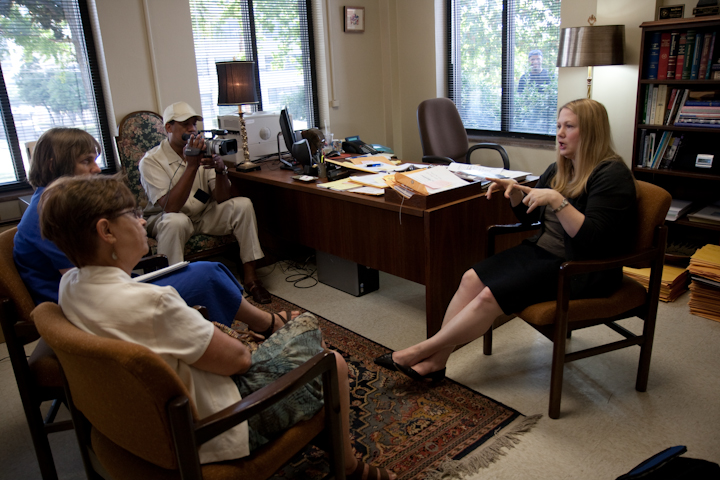
In April 2009, when Forbes magazine labeled Memphis, Tennessee, as the second-most dangerous metropolitan area in the United States (after Detroit), at least a dozen residents of Memphis refused to accept this bleak assessment of their city. Instead they vowed to continue their work of changing the culture of Memphis, little by little.
On the surface these people have little in common: manager of subsidized housing complex, top security official in city schools, assistant district attorney, retired GM factory worker, teen who belonged to a gang, schoolteacher, real estate agent. But all are committed to deepening their understanding of alternatives to violence (to self and society).
All want to spread that understanding to the people and systems that they touch. All believe Memphis has the ability to transform itself into a network of healthy and secure communities, even serving as a model for other U.S. cities.
All have a connection to Turning Point Partners (with branches in Tennessee and Louisiana), a non-profit group that relies heavily on EMU’s Center for Justice and Peacebuilding (CJP) for new knowledge, skill-building, and revitalization when burn-out threatens.
Seven of the 15 Memphis residents mentioned in this fall/winter 2009 issue of Peacebuilder have received training at EMU. Several others plan to enroll in the 2010 session of EMU’s Summer Peacebuilding Institute.
When Jean Handley decided to make Memphis her new home in 2007, she brought the Turning Point Partners concept from her old home in New Orleans.
In New Orleans, Turning Point has popularized “community-building circles” in which participants literally sit in a circle and pass a “talking stick,” guided by a trained facilitator. These circles permit mutual problem-solving and create a sense of a common, hopeful future.
Restorative justice is a cornerstone of Turning Point Partners, as is “mindful communication,” a way of talking that encourages compassion for, and awareness of, self and others. Such great concepts, plus a good track record in New Orleans (maintained by Lou Furman, Handley’s successor as director of Turning Point Partners in Louisiana) – but how to introduce Turning Point to Memphis?
Handley started by making herself available to government agencies, churches and community centers for free presentations on restorative justice, the circle process and non-violent communication. She contacted local leaders and asked for meetings to introduce herself and her previous work. She produced her own fliers and business cards.

And she began to find allies. Some of them have jobs in the “system,” but others are church or community people who felt that volunteering with Turning Point Partners gave them an opportunity to build a better future for themselves and all of Memphis.
When Jacob Flowers, director of the Peace & Justice Center of Memphis, first met Handley in 2007 he recognized a kindred spirit. Like school assistant superintendent Gerald Darling, Flowers and his co-workers wanted to break the “cradle to prison pipeline” in Memphis. In the tradition of Martin Luther King Jr. (who was assassinated in Memphis in 1968), Flowers’ group had advocated for, and won, non-violence studies in the Memphis school system in the late 1980s and 1990s. Yet the Peace & Justice Center is more of an advocacy group than a group that implements the changes it proposes. Turning Point Partners was positioned to offer trainings in the relationship skills people require to change themselves and their communities. For Flowers, the work of the two groups was highly complementary. Handley became a member of his board of directors, and he became a member of hers.
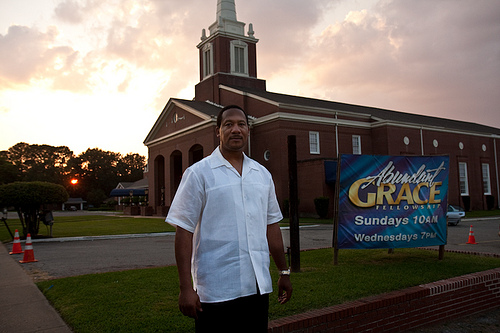
Frank Black, who owns a cleaning and landscaping business, signed on to be a volunteer with Turning Point Partners after he heard Handley give a talk at Abundant Grace Fellowship, where Black is head deacon. Black and his pastor, Dwayne Hunt, want their church to lead the way in embracing restorative practices. “In the churches, we teach and preach about Christ and restorative principles,” Black says. “We have to make it tangible and manifest in people’s lives. We have to get in and change people’s hearts so they see a better way.”
Last spring (’09), Black noticed strife between the young people raised in the church and those coming from the surrounding neighborhood, attracted by outreach ministry. Black invited Handley to lead the first circle ever at Abundant Grace Fellowship. In a two-hour circle process, the 45 teenaged participants shared tearful stories and deep feelings and moved toward “new understandings, relationships, and reconciliation that have been maintained to this day,” says Black. Handley notes that this was a breakthough, since the group included members of opposing street gangs. “Our circles are not always that successful,” she adds. “But the key is to keep at it – I’ve never seen circles utterly fail.”
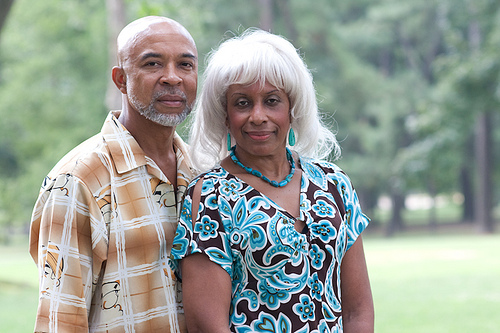
Michael and Vickie O’Neal happened to be visiting Abundant Grace in the fall of 2008, checking out possible churches to attend in Memphis, when Frank Black invited them to come to a talk Handley was giving on ways that restorative justice can help juvenile offenders. The O’Neals attended that talk and said “wow” over what they heard (Michael’s word). Feeling that any church sponsoring such a presentation was a good one, the O’Neals soon became active members of Abundant Grace, as well as volunteers with Turning Point Partners.
Michael says this is the first time in his life where he is doing something that he feels truly called to do. Earlier, when he was living in Atlanta and earning good money as a skilled tradesman at General Motors, he was “mentally suicidal, depressed, drinking – the weight of the world was on me.” In 2008, Michael received a buy-out package from GM, freeing him of pressure to take a 40-hour-a-week salaried job. Now he owns and operates O’Grass Lawncare Service.
Sober for four years and freshly married to real-estate businesswoman Vickie, Michael says he is “growing into the person I want to be – going to church, reading the word of God, living the word of God” and responding to God’s invitations, like the one extended through Black.
Michael especially likes the circle process because “you meet in a powerful place and you become as one. You establish something you never had before – relationships. You learn that people have had experiences just like you. It’s different than a service at church. It’s not scripted. Your voice is an important voice, as important as anyone’s. It becomes a spiritual voice inside that room. God is in that place. Real healing goes on right there.”
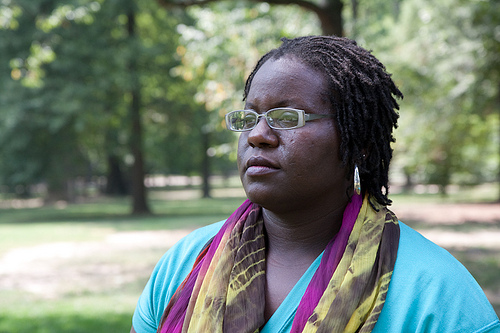
Olliette Murry Drobot, program director for Southeast Memphis Community Development Corporation, is in charge of community-based efforts to reduce crime in her sector of the city. After hearing Handley give an introductory talk on restorative justice in November 2008, Drobot teamed up with Turning Point Partners to build partnerships with law enforcement, the local school system, and the private sector. In the fall of 2009, one of Drobot’s goals was getting a pilot conflict-transformation program into a troubled elementary school. Another goal was assisting with building a sense of community among residents of a government-subsidized apartment complex in southeast Memphis, Autumn Ridge Apartments. Debra McIntosh, the executive manager for the apartments, has lingered after her work hours to support the weekly circles led by Turning Point Partners. (See “Talking Stick Helps Heal”.)
In New Orleans, Handley had both grant money and government funding to underwrite the work of Turning Point Partners, enabling her and several colleagues to receive pay for their work. In Memphis, the Assisi Foundation partly funded the work of Turning Point Partners with the Department of Children’s Service for two years. Since the economic downturn, however, Turning Point Partners has relied on committed volunteers.
The group lost the energies this autumn (’09) of several valuable, enthusiastic people who simply had to have some source of regular income. Veteran schoolteacher Johnnie Hatten, who enthusiastically took restorative justice and another class at EMU’s Summer Peacebuilding Institute (’09), had to return to the classroom. Deidre Daw took a teaching job too, vowing to “take circles into the schools” with her. Brenda Alexander, a former pre-trial release counselor who took two classes at EMU this summer – restorative justice and dialogue facilitation for crimes of severe violence – has taken a job as a home-care worker, though she “would love to work in the field of restorative justice. I feel very blessed to have met Jean and to have gone to EMU.”
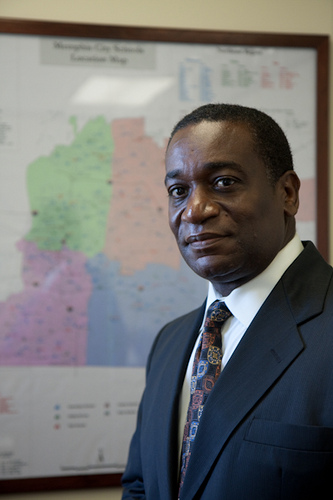
In the summer of 2008, the Memphis school board accepted the recommendation of their new superintendent and lured a former colleague of his, Gerald Darling, from his job overseeing security in the Miami-Dade County school system in Florida. Darling had collaborated in Miami with renowned restorative justice expert Gordon Bazewell to use restorative discipline processes to keep troubled teens in their classes, still learning, instead of suspended or expelled. If put outside, these teens tended to commit more offenses, on their way toward being school drop-outs and eventually imprisoned adults. “Most suspensions are for fighting, and putting the student out on the streets doesn’t stop the cycle of fights, but restorative justice can, and does,” said Darling in a August (’09) interview with Peacebuilder.
Darling referred the interviewer to America’s Cradle to Prison Pipeline, a 2007 report by the Children’s Defense Fund, which contained this surprising piece of information: Based on reading and math test scores of upper elementary-age children, corrections department officials can make fairly accurate projections of how many of them will end up in prison as adults. Why not use this information for the opposite purpose – that is, for identifying who needs help to avoid the track to prison?
“For every student we save and graduate, this represents a monetary value to the community,” says Darling. “When we stop spending $70,000 a year for incarceration and enable people to actually contribute to the economy and raise a healthy family, this adds millions of dollars to the economy.”
Darling wants the several hundred staffers under him to be trained in restorative justice practices, beginning with those in the 14 schools with the most security-threatening incidents. “I’ve been doing this for a long time,” he says. “If you change the students’ behavior, it will transfer into their families and community.”
Jasamine Tiana Holmes, 17, would make a great “Exhibit A” in support of Darling’s arguments. She dropped out of school at age 14, after grade 9 (the usual drop-out grade).” I was so angry and mean – I gained my respect by fighting. God forbid any teacher try to tell me what to do. I’d cuss her out and be gone.” Her parents were separated – dad in the navy, mom occupied with work and other things. By middle school, Holmes was smoking, drinking, doing drugs and gang banging. She stabbed someone in an argument over microwaving noodles. She was in and out of jail.
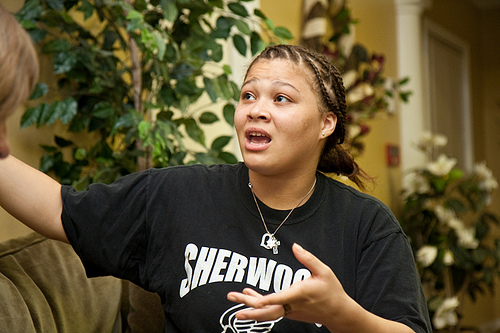
Somehow Holmes found her way to the first youth circle held at Abundant Grace Fellowship last May (’09). “It was a release to tell my story in that circle,” she said. “Miss Jean and Brother Frank and the others at Turning Point helped me. I still have problems, but I got a better way of dealing with them.” She has learned, for instance, how to let her father know, “I just want you to say you love me.”
Holmes is Turning Point Partner’s youngest volunteer – she almost never misses a meeting or a circle process. In June (’09) she came with Black, O’Neal, and Alexander to the Summer Peacebuilding Institute, where she took “STAR: Breaking Cycles of Violence, Building Healthy Communities.” She went home feeling transformed, hoping to finish high school through GED studies and return one day as an undergraduate.
When Holmes was into looking and acting tough, she had lots of company in Memphis. The office of assistant district attorney Terre Fratesi receives about 15,000 referrals for misbehaving (or downright criminal) juveniles from the schools of Memphis City and surrounding Shelby County each year. Like school security chief Darling, Fratesi would like to see this flood of referrals dwindle to a trickle. She agrees with Darling – putting troublesome kids out of the schools only shifts their troubles somewhere else.
As the lead prosecutor for offenses committed by juveniles in Memphis, Terre Fratesi handles “the worst of the worst – the rapes, homicides, shootings, stabbings.” Over the years, though, she has observed that few felt good at the end of the judicial process. “Even the victims walked out feeling empty,” she said.
With Jean Handley’s help, Fratesi has become familiar with the way restorative justice helps to meet the emotional and informational needs of victims of crime, while giving offenders a way to make amends and get off the criminal flywheel.
Reflecting on the various “silos” of people in Memphis who care about young people, “I think the major players have good intentions,” Fratesi says. “But there is a huge disconnect between all of us who want to do the right thing for kids. How do we get from here to there?”
The folks who call themselves Turning Point Partners think the best place to start is by building honest, trusting relationships, one person at a time, regardless of each person’s “silo” and then working together to transform self and community, little by little.
